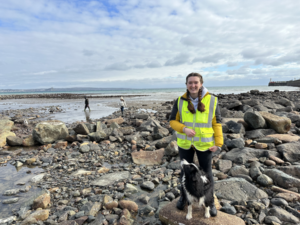- ...
Postgraduate Studentships - Search for funding opportunities.

From someone with an agricultural and engineering family history that grew up two hours from the nearest beach, studying marine biology is quite a contrast. My fascination for the subject was fueled by a family trip to Lanzarote where I was introduced to scuba diving. The feeling of being encompassed by water, yet still being able to breathe, was so mesmerising that I cannot describe the utter euphoria I felt. From then on, I decided that I would study marine biology.
As a leading university for marine research, Plymouth caught my eye with a large option of marine-related courses to explore. I chose to study Marine Biology and Coastal Ecology because it opened up a range of opportunities: from field trips to France and South Africa, to scientific diving modules. The vast number of facilities and opportunities, such as the HSE SCUBA Diving Course and the COAST Laboratory, ensured that Plymouth was the choice for me.
The support and encouragement I received from the University was immense. Since graduating, the Careers Service has provided support in both job seeking and postgraduate opportunities. The team encouraged me to undergo my masters in Sustainable Environmental Management, alongside working for ARC Marine – a team leading the way in nature inclusive solutions in marine environments.
Coastal communities are under constant pressure from coastal erosion and flooding. As someone who has seen the impacts of eroding coastlines up close and the negative impact it has on coastal communities, I can understand the need to protect people’s livelihoods. That is why I want to create a solution that can be implemented globally to not only protect coastal communities, but to promote native biodiversity.
I first joined ARC Marine as an intern focusing on sustainable business development through the Sustainability Hub: Low Carbon Devon. My passion is within the vast waters of the coastal zone and the company provided me with an incredible opportunity to hone my skills during my master studies.
My advice to anyone with similar career interests is to grab any opportunity you can. Get involved with University researchers, commercial researchers, citizen science projects and volunteer. This will allow you to build your profile of experience.
After I complete my masters, I have planned three possibilities. The main goal is to eventually complete my PhD in ecological engineering and nature-inclusive designs, which will hopefully lead to real-world experiments.
I am also looking into Knowledge Transfer Partnerships to create a research relationship between ARC Marine and the University, which would lead to the development of my academic and commercial skills.
Another possibility is to develop my skills working full time in the eco-engineering field. This would allow me to develop my real-world knowledge before applying it to any future research opportunities including a PhD.

Postgraduate study opportunities at University of Plymouth About us At the University of Plymouth, we are proud to be a top 3 modern UK university (T...